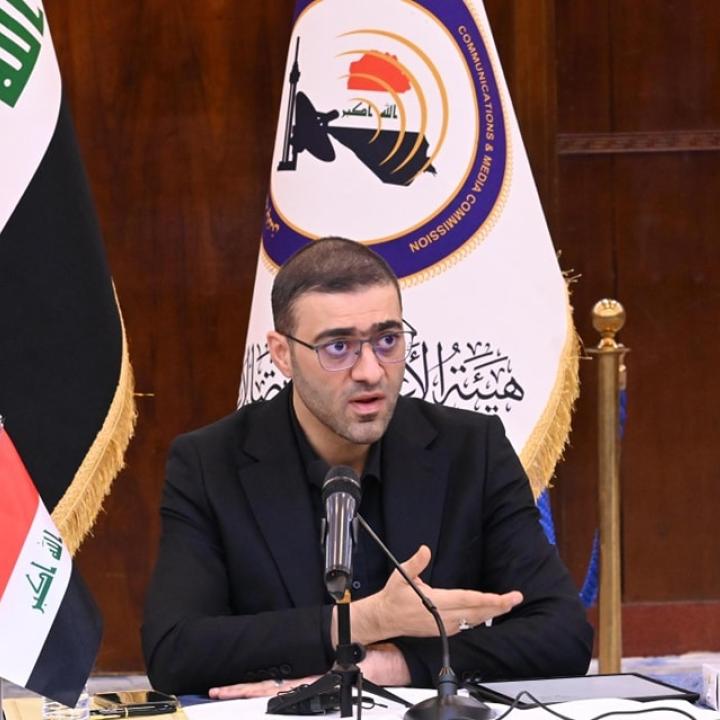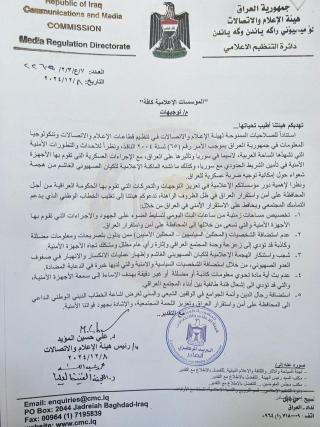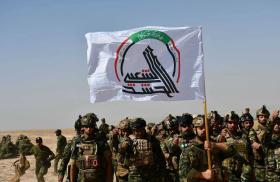
Iraq's Militia-Led Communications Commission Clamps Down on Press Coverage of Security Issues

The CMC's latest restrictions on press freedoms indicate that Iran-backed groups fear they could be ousted from power much like Bashar al-Assad next door.
As members of Iran's so-called "axis of resistance" are expelled from Syria amid the fall of the Assad regime, Iraq’s self-styled muqawama (resistance) militias have grown increasingly paranoid about the potential for a domestic uprising that could threaten their own hold on power.
A leading edge of this paranoia, the militia-dominated Communications and Media Commission (CMC) is swiftly implementing measures aligned with muqawama demands. For example, it recently issued a letter with “directives” to “all media organizations,” with the stated goal of countering “the media machine of the usurping Zionist entity." According to the CMC, Israel is "waging a fierce attack, threatening the possibility of launching a military strike against Iraq.” This statement highlights the intense paranoia currently gripping Iraqi muqawama groups, who perceive growing external and internal threats to their position. To counter these alleged threats, muqawama figures are increasingly calling for restrictions on Iraq's media space. Their rationale is that curbing freedom of speech will help prevent such conspiracies from materializing.
Signed by CMC director-general Ali Hussein al-Moayad, the letter included the following directives (as translated from the original Arabic in Figure 2):
- To allocate time slots from daily broadcast hours to highlight the efforts and measures undertaken by the security forces, through which they seek to maintain the security and stability of Iraq.
- To not host figures (political and security analysts) who make misleading and false statements and information that may lead to destabilizing Iraqi society and arousing misleading public opinion that is skeptical of the security services.
- To condemn and denounce the media onslaught of the usurping Zionist entity and to show the defeat and collapse in the ranks of the Zionist enemy, by hosting political and security figures who have experience in counter-propaganda.
- Not to broadcast any material containing false, misleading, or inaccurate information with the aim of harming the reputation of the security services, which may lead to igniting sectarian strife among members of Iraqi society.
- To host clerics and imams of mosques affiliated with the Shia and Sunni endowments for the purpose of spreading the national religious discourse calling for preserving the security and stability of Iraq, strengthening societal cohesion, and praising the efforts of our security forces.
It should be noted that the CMC, even before its takeover by CF militias in 2022-2023, was sometimes used by the state as a means to prevent politicians from making inflammatory sectarian remarks or otherwise worsen the counter-terrorism challenge in Sunni and mixed areas. Nevertheless, and while not fully binding on media outlets, contemporary CMC directives probably do reflect the specific panic felt within the CF partners at developments in Syria. Critics of the CMC can argue that the push to curtail media freedoms, supported by directives from the CMC, highlights a pan-CF strategy to dominate the narrative under the pretext of safeguarding national security and stability. This may reflect their desire to preempt any new movement resembling the Tishreen protests.




